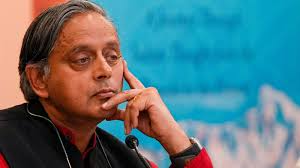‘How could you be so dishonest?’: Congress leader calls Shashi Tharoor ‘super spokesperson of BJP’

A senior Congress leader recently accused Shashi Tharoor, the veteran Congress MP and former diplomat, of acting like a “super spokesperson of BJP.” This strong accusation came amid rising political tensions as parties prepare for upcoming elections. The incident exposed some internal differences within the Congress party.
The Accusation and Its Context
The criticism came during a media interaction where a prominent Congress figure spoke openly against Tharoor’s recent public statements. The leader said Tharoor’s comments often echoed the Bharatiya Janata Party’s (BJP) narratives. This, they argued, weakened the party’s position.
“How could you be so dishonest with your own party and the people who trust you?” the leader asked. The phrase “super spokesperson of BJP” was used sarcastically to highlight the irony of a Congress member sounding like a BJP supporter.
Shashi Tharoor’s Political Persona
Shashi Tharoor is one of Congress’s most well-known and articulate voices. He has a diplomatic background and is famous for his eloquence. Tharoor has often criticized BJP policies on secularism, minority rights, and democracy.
However, some in the party feel Tharoor sometimes seems out of sync with the party leadership. His independent views and outspoken nature have caused friction within Congress. While many value his intellect, some see him as a source of internal conflict.
Internal Divisions within Congress
This incident reveals bigger challenges in Congress. The party struggles with unity and clear leadership. BJP’s strong national presence has pushed Congress to reinvent itself.
Experts say public disagreements like this show deep divides within Congress. Some leaders want a united and disciplined voice. Others want more open debate. Critics say Tharoor’s frequent media presence can confuse voters and dilute the party’s message.
Supporters argue Tharoor’s freedom to speak helps democracy. They believe open debate within parties is healthy and necessary.
BJP’s Reaction and Political Jokes
The BJP used this controversy to highlight Congress’s weaknesses. Some BJP leaders even joked that Tharoor is their “super spokesperson.” This sarcastic label points out how political messages sometimes overlap.
This episode shows how political communication in India has become highly strategic. Parties often exploit their rivals’ weaknesses for electoral gain. The BJP’s growing dominance forces the opposition to rethink its strategies constantly.
The Bigger Picture: Opposition’s Dilemma
This episode comes amid a tough political climate. Opposition parties must manage internal differences while presenting a united front against the BJP.
Congress is India’s oldest party but has a complex structure. This sometimes slows down decisions. Party leaders must balance voices like Tharoor’s with grassroots demands and election plans.
Experts believe that while internal disagreements can hurt Congress in the short term, they could lead to stronger debates about the party’s future.
Shashi Tharoor’s Response and Public Perception
Tharoor has not responded directly to these allegations yet. But on social media, he continues to engage with followers on democracy, governance, and social justice.
Supporters view him as a principled leader who speaks truth to power, even when it upsets his party. His international reputation adds weight to his views. However, critics say his tone can alienate grassroots workers and voters.
Public opinion is divided. Some see the incident as harmful infighting. Others appreciate the transparency and freedom of expression it shows.
Political Stakes Ahead
With important elections coming, Congress needs to unify and present clear policies to challenge BJP. Leaders like Tharoor will play key roles, either as dissenters or unifiers.
This incident highlights the challenges in India’s vibrant democracy. Balancing individual expression with party unity is tough, especially with intense competition and media focus.
Conclusion
The charge of dishonesty against Shashi Tharoor by a Congress leader highlights internal struggles in Congress at a crucial time. Tharoor’s sharp critiques are part of political debate, but this episode shows the fine line leaders must walk between free thought and party loyalty.
In the coming months, it will be clear whether Congress can overcome these divisions and emerge stronger or if internal conflicts will weaken its position in India’s political arena.






